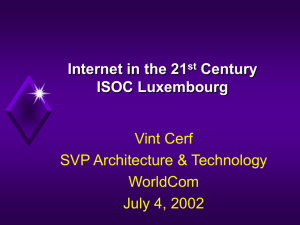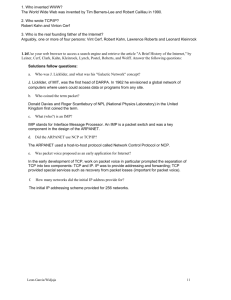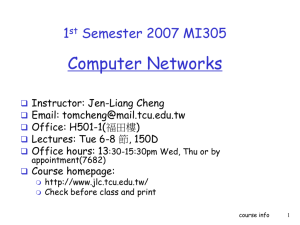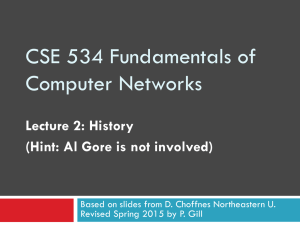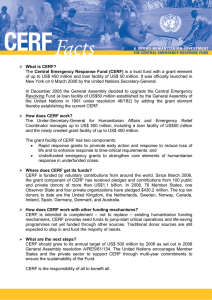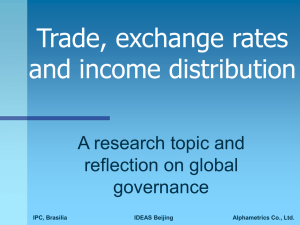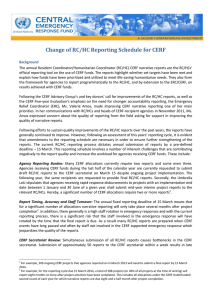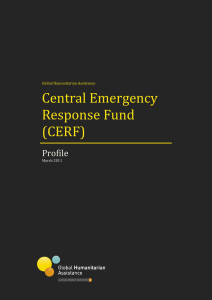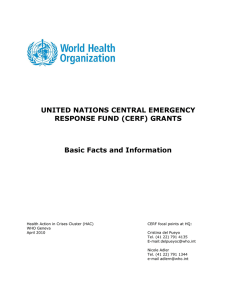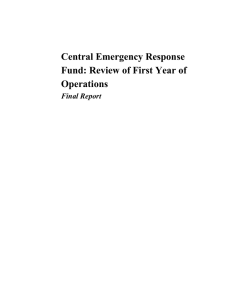List of different ways of internet usage Finding information Catch up
advertisement
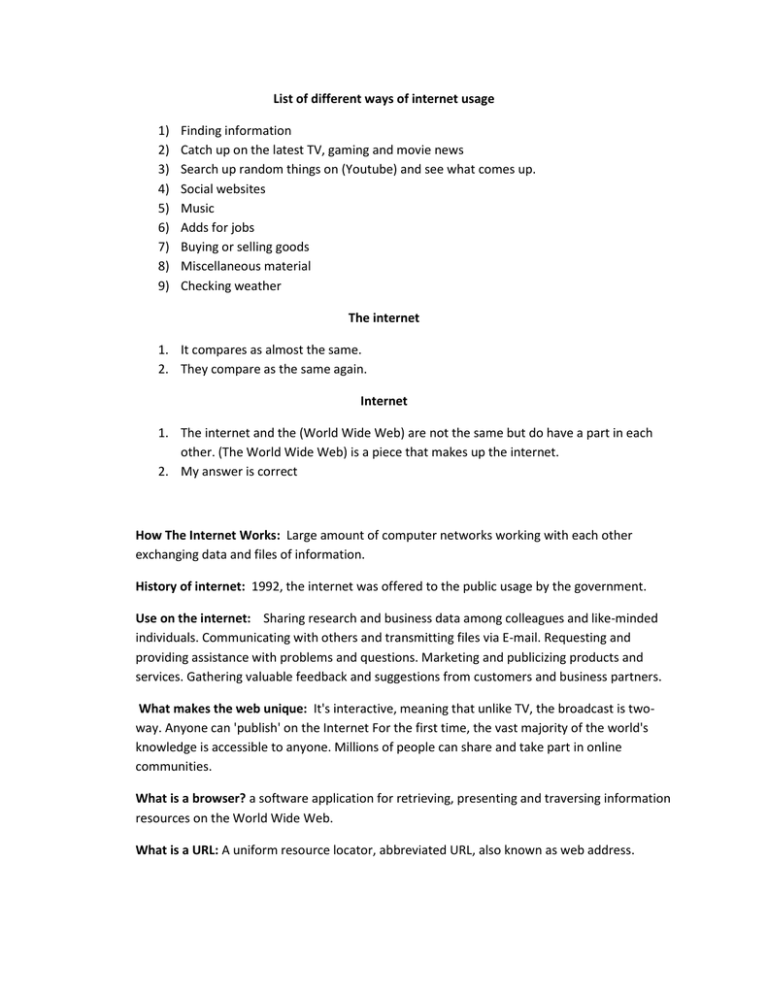
List of different ways of internet usage 1) 2) 3) 4) 5) 6) 7) 8) 9) Finding information Catch up on the latest TV, gaming and movie news Search up random things on (Youtube) and see what comes up. Social websites Music Adds for jobs Buying or selling goods Miscellaneous material Checking weather The internet 1. It compares as almost the same. 2. They compare as the same again. Internet 1. The internet and the (World Wide Web) are not the same but do have a part in each other. (The World Wide Web) is a piece that makes up the internet. 2. My answer is correct How The Internet Works: Large amount of computer networks working with each other exchanging data and files of information. History of internet: 1992, the internet was offered to the public usage by the government. Use on the internet: Sharing research and business data among colleagues and like-minded individuals. Communicating with others and transmitting files via E-mail. Requesting and providing assistance with problems and questions. Marketing and publicizing products and services. Gathering valuable feedback and suggestions from customers and business partners. What makes the web unique: It's interactive, meaning that unlike TV, the broadcast is twoway. Anyone can 'publish' on the Internet For the first time, the vast majority of the world's knowledge is accessible to anyone. Millions of people can share and take part in online communities. What is a browser? a software application for retrieving, presenting and traversing information resources on the World Wide Web. What is a URL: A uniform resource locator, abbreviated URL, also known as web address. What are applets: an applet is any small application that performs one specific task that runs within the scope of a larger program, often as a plug-in. The Net Around The World Do all countries welcome the world wide web: Yes all the countries welcome the world wide web, hence its name. What inventions set the stage for this unprecedented integration of capabilities of the internet: Telegraph, telephone, radio, and computer set the stage for this unprecedented integration of capabilities. What is the ISOC and who are its members: Alain Aina, Eric Burger, Narelle Clark, Keith Davidson, Raúl Echeberría, David Farber, Eva Frölich, Bob Hinden, Jason Livingood, Lynn St. Amour, Theresa Swinehart, Rudi Vansnick, and Bert Wijnen. What are the ten most significant internet events 1.ARPANET - the military research network of the 1960s that became the Internet. 2.Hypertext - interlinking of digital text and media, predicted by Vannevar Bush in the 1940s, developed by Ted Nelson and Douglas Engelbart in the 1960s. 3.Email - invented in the 1970s and is the bedrock of Internet-based communications (honourable mention to Hotmail for making email more accessible in 1996 by offering the first free web-based email service). 4.Domain Name System (DNS) - gives us the ability to use plain language web addresses. 5.MUDs (Multi-User Dungeon/Domain) - the first form of networked games, developed in the late 1970s and is the precursor to modern forms of collaborative and online gaming such as Massively multiplayer online role-playing games (MMORPG). 6.Archie - first Internet search engine (for FTP sites), developed at McGill University in 1990. 7.World Wide Web (WWW) - Tim Berners-Lee creates the ultimate digital medium in 1991. 8.Mosaic - user-friendly browser launched in 1993 that accelerated the popularity of the Web by displaying images and text together. 9.Netscape's Initial Public Offering - the browser's phenomenal IPO propelled Internet development and usage. 10.Secure Socket Layers - Netscape's encryption system, developed in the mid 1990s, helped make the web secure enough to allow e-commerce and e-banking to flourish. First ARPANET link was established between what two universities: University of California, Berkeley, National Physical Laboratory. What was the date of this event: 5 August 1968 Tim Berners-Lee: A graduate of Oxford University, Tim Berners-Lee invented the World Wide Web, an internet-based hypermedia initiative for global information sharing while at CERN, the European Particle Physics Laboratory, in 1989. He wrote the first web client and server in 1990. His specifications of URIs, HTTP and HTML were refined as Web technology spread. He is the 3Com Founders Professor of Engineering in the School of Engineering with a joint appointment in the Department of Electrical Engineering and Computer Science at the Laboratory for Computer Science and Artificial Intelligence ( CSAIL) at the Massachusetts Institute of Technology (MIT) where he also heads the Decentralized Information Group (DIG). (http://www.w3.org/People/Berners-Lee/) Marc Andreessen: Marc was a student and part-time assistant at the National Center Supercomputing Applications (NCSA) at the University of Illinois when the World Wide Web began to take off. His position at NCSA allowed him to become very familiar with the Internet. Like just about everyone else who was involved with the Internet, he also became familiar with the Web. Most of the browsers available then were for UNIX machines which were expensive. This meant that the Web was mostly used by academics and engineers who had access to such machines. The user-interfaces of available browsers also tended to be not very user-friendly, which also hindered the spread of the Web. Marc decided to develop a browser that was easier to use and more graphically rich. (http://www.ibiblio.org/pioneers/andreesen.html) Vincent Cerf: Widely known as one of the "Fathers of the Internet," Cerf is the co-designer of the TCP/IP protocols and the architecture of the Internet. In December 1997, President Clinton presented the U.S. National Medal of Technology to Cerf and his colleague, Robert E. Kahn, for founding and developing the Internet. Kahn and Cerf were named the recipients of the ACM Alan M. Turing award in 2004 for their work on the Internet protocols. The Turing award is sometimes called the "Nobel Prize of Computer Science." In November 2005, President George Bush awarded Cerf and Kahn the Presidential Medal of Freedom for their work. The medal is the highest civilian award given by the United States to its citizens. In April 2008, Cerf and Kahn received the prestigious Japan Prize. (http://www.icann.org/en/groups/board/cerf.htm) Which region has the highest usage % in the world: Asia Which region has the highest usage growth in the world during 2000-2005: Africa. 3606% Where does North America rank among the world regions in percentage of internet usage: 3rd. 11.4% What is your prediction of the future of the internet: The Internet will grow faster, larger, with new developments and applications. In order to be on the internet, you need the following: 1. 2. 3. 4. Modem Phone Line (dedicated is best) ISP – Internet Service Provider Anti-Virus Software A computer Resources for this Web Quest lhttp://www.centerspan.org/tutorial/net.htm lhttp://www.isoc.org/internet/history/brief.shtml lhttp://en.wikipedia.org/wiki/History_of_the_Internet lhttp://smithsonian.yahoo.com/index.html
